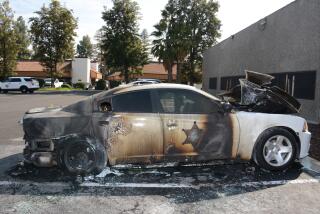Lawyer Silences Suspect in Utah Bomb Killings
- Share via
SALT LAKE CITY — The chief suspect in a pair of fatal bombings tried to make a statement Friday from the hospital bed where he lay seriously injured from a third bomb blast, but his lawyer stopped him, authorities said.
Mark Hofmann had asked for a tape recorder early Friday but attorney Ronald Yengich later advised his client against the move, said Deputy Salt Lake County Atty. Bud Ellett.
Hofmann, 30, a documents dealer who reportedly made more than $200,000 last year from the gray market trade in Mormon relics, was injured when a bomb exploded in his car Wednesday. He was in serious but stable condition at LDS Hospital.
Search for Motive
Authorities believe the booby-trapped pipe bomb was intended for a third victim, possibly associated with the same venture capital firm linked to the other victims. Steven Christensen, a former officer in the firm, CFS Financial, and Kathleen Sheets, the wife of its president, were killed Tuesday in separate bomb blasts.
“We’re looking at the (Mormon) papers, the finances or both as the motive right now,” said Salt Lake County Sheriff Pete Hayward. “The motive is within these circles but what exactly it is we don’t know.”
One link between Hofmann and the two killed was the so-called “White Salamander Letter,” which ties church founder Joseph Smith Jr. to folk magic and treasure digging. Gary Sheets, husband of the dead woman, helped finance research into the 19th-Century letter.
$250,000 in Auto
Authorities were also expected to question Hofmann about the $250,000 in cashier’s checks and money orders found in his car along with raw materials for bombs and hundreds of pages of what appear to be Mormon documents and original Scripture.
The papers included what may be the so-called McLellin Collection, which could contain diaries and Egyptian-like characters said to have been “translated” by Smith into church Scripture. McLellin was a member of the Mormon Church’s Council of Twelve Apostles from 1835 to 1838, when he was excommunicated.
(Earlier this year, Hofmann told The Times that he was attempting to finalize arrangements to purchase the McLellin Collection.)
More to Read
Sign up for Essential California
The most important California stories and recommendations in your inbox every morning.
You may occasionally receive promotional content from the Los Angeles Times.








